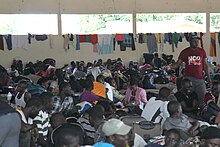 Haitian immigrants housed in makeshift accommodation in Brasileia in Acre in 2014. Photo: Luciano Bridges / SECOM - Public Photos | |
| Total population | |
|---|---|
| 135,000 (2020)[1] | |
| Regions with significant populations | |
| Porto Velho, Brasiléia, Manaus, São Paulo and Curitiba | |
| Languages | |
| Portuguese, French, and Haitian Creole | |
| Religion | |
| Roman Catholicism, Haitian Vodou, Protestantism | |
| Related ethnic groups | |
| Haitians, Haitians in the Dominican Republic, Haitian Americans, Haitian Canadian, Haitian Cuban, Haitian Bahamian, Haitian Chilean, Haitians in France |
A Haitian Brazilian (Portuguese: Haitiano-Brasileiro, French: Haïtien Brésilien, Haitian Creole: Ayisyen-Brezilyen) is a Brazilian person of full, partial, or predominantly Haitian ancestry, or a Haitian-born person residing in Brazil.
Haitian immigration to Brazil become a migratory phenomenon that gained large after the earthquake that rocked Haiti in 2010. The presence of Haitians in Brazil was negligible before the political instability that affected the country in 2004. Since then, the presence of military peacekeepers UN (mostly Brazilian), Haitians have come to see in Brazil a reference point, a fact that was reinforced after the disaster, which triggered the great migratory wave that started in 2010. Another important reason for the increase in the arrival of people from Haiti in Brazil were the migration opportunities created in 2014 during the FIFA World Cup in Brazil and in 2016 during the Summer Olympics held in Rio de Janeiro, Brazil – as well as the creation of a humanitarian visa for Haitians by the Brazilian authorities in 2012.[2]
- ^ "Imigrantes Internacionais Registrados no Brasil". www.nepo.unicamp.br.
- ^ Sangalli, Lucas Cé; Carmo Santos Gonçalves, Maria do (2020), Bahl, Eva; Becker, Johannes (eds.), "Migrants and Refugees from Ghana and Haiti in Southern Brazil: Familial Constellations and Processes of Escape", Göttinger Beiträge zur soziologischen Biographieforschung, Göttingen: Göttingen University Press, pp. 83–102, doi:10.17875/gup2020-1315, ISBN 978-3-86395-454-3, S2CID 229221772, retrieved 2022-03-07